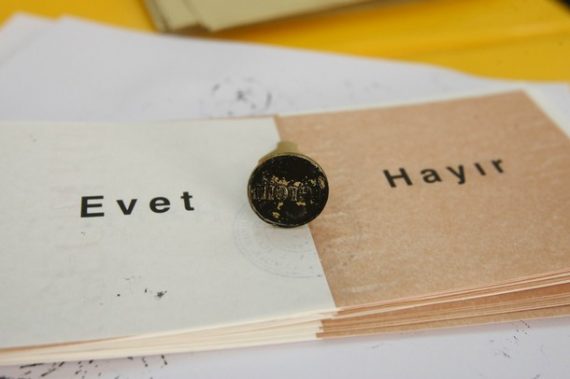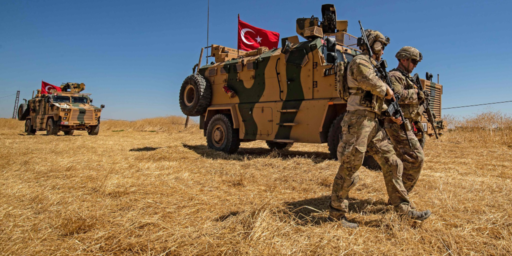Turkey’s Islamist Democracy
Turkey reformed its constitution over the weekend, in what Prime Minister Recep Tayyip Erdogan promised "will go down in history as a turning point in Turkish democracy." But there's strong disagreement over which way it's headed.
Turkey reformed its constitution over the weekend, in what Prime Minister Recep Tayyip Erdogan promised “will go down in history as a turning point in Turkish democracy.” But there’s strong disagreement over which way it’s headed.
My New Atlanticist post “Turning Point in Turkish Democracy” rounds up the commentary, which is divided over the extent to which we’re seeing strengthening of democracy and the rule of law, the strengthening of Erdogan’s cult of personality, and the decline of secularism in Europe’s only Islamic democracy. My inclination is that we’re seeing all three.
A trusted friend who has just returned from one of his regular visits to Turkey tells me that the polarization is getting worse and that the “pressure on the parts of population that are not ostensibly practicing their Muslim faith will increase every day.”
While I share this concern over the move away from secularism in Turkey’s politics, I’m mostly concerned about what it signals about Turkey’s commitment to not only Western values but the West itself. There are a lot of worrisome signs in this regard, including recent polls showing a radical dropoff in Turkish support for joining the European Union.
So far, at least, the U.S. government is publicly dismissing these concerns. Philip Gordon, the assistant secretary of state for European and Eurasian affairs, maintains that the bilateral relationship is “very important and strategic” and went so far as to proclaim, “We don’t have such an open and ongoing dialogue with any other country in Europe.”
Much, much more at the link.






Unfortunate. My parents visited Turkey a few years ago and they still held Atatürk in very high regard (almost to the point of being unhealthy, regardless of the good he did). It would be unfortunate if they now turned their backs on one of his key points when he modernized the country, which was the secularization of the government.
Of course, the part that many US commentators miss is that it is the AKP (the current party of power that is based on a version of political Islam) that is pro-EU. Further, the reforms in question forwarded the process towards EU inclusion.
I would also add that I agree that we are seeing “the decline of secularism”–but one has to remember (as you know, but many readers likely do not) that Turkisjh secularism is at quite the extreme end of the spectrum to the point that parties with religious bases have been disbanded and banned in the past (which is antithetical to democracy). It would be as if groups like the Moral Majority were not allowed to operate because they were too keen on mixing religion and politics.
Indeed, the reforms in question that are diminishing secularism are specifically those which remove the military as the guardian of secularism–that’s a good thing (and a democratic thing).
Seems in poor taste to point fingers at Turkey at a time when America’s religious fanatics are taking over a major political party.
Great.
Thanks for the update. I saw were most people were thinking it would pass.
I guess Atta Turk really was one in a million.
Is there any other place in the world or time in history where the military was responsible for keeping a state secular?
You look at the strategic location of Turkey in the world geographically, surrounded by hotspots and it’s hard not to get worried about it.
I hate to sound like a Liberal, but -when dealing with their culture the Turks might have developed something that was best for them.
It’s had a great stabilizing effect.
Look at the developments and advancements made in Turkey historically in comparison to any similar regions that did not have the military enforced secularism. Start with their achievement of literacy by percentage and just how much earlier they achieved that.
It’s almost as if Atta Turk was a military accelerant.
When you have a religion that justifies the sword-how best do you “nuetralize” that? The sword of secularism seems like a good answer to me.
IIRC
Atta Turk also banned the burqa.
Speaking of which have you seen this map @ Le Monde?
http://www.lemonde.fr/societe/infographie/2010/07/22/la-legislation-sur-le-voile-integral-en-europe_1391236_3224.html#ens_id=1411207
Google translator only helps a little bit here. The red areas are complete bans on burqas, and the green areas have no bans (with two in-between colors for partial bans)?
Second from the top is Total Bans in certain in certain regions and municpalities (not national ban).
Third is partial bans in certain public areas.
“Is there any other place in the world or time in history where the military was responsible for keeping a state secular?”
Iran under the Shah. Ataturk simply gave the Turkish military more legitimacy than the Shah ever wielded.
I take that back. Turkey had an army that existed as independent institution that saw it’s obligation as protecting the constitutional order. Iran had a secularizing monarch that used the military and security forces to further his goals.
A better comparison might be Honduras, which deposed the President for violating the Constitution.
“There are a lot of worrisome signs in this regard, including recent polls showing a radical dropoff in Turkish support for joining the European Union.”
Hardly surprising since the EU (or more particularly France and to a lesser extent Germany) have been giving Turkey the runaround for at least five years.
” I take that back. Turkey had an army that existed as independent institution that saw it’s obligation as protecting the constitutional order.”
So that’s why they’ve overthrown severally democratically elected govt’s in military coups?
The main purpose of the constitutional changes was to clip the wings of the Judiciary who are in the pocket of the military. A couple of years ago they stepped back from the brink of banning Erdogan’s party because they and the military were fearful of the consequences.
Turkey is Charlie Brown and the EU is Lucy yanking the ball away everytime. I’m surprised the Turks have been as patient with the EU as they’ve been.